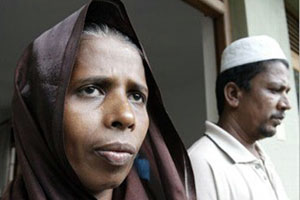
Caritas Sri Lanka National Director has visited the parents of Rizana Nafeek to discuss efforts for her release.
Credits: Caritas Sri Lanka
Campaigners are hoping that the plight of Sri Lankan death row housemaid Rizana Nafeek could end soon with her release from a Saudi Arabian prison and her return home.
Rizana Nafeek was sentenced in 2007 to beheading for strangling a baby she was looking after as a nanny in 2005. Rizana was just a minor herself when the tragedy took place. She maintains that it was an accident caused by her inexperienced efforts to save the baby from choking.
Riyadh Acting Governor Prince Sattam updated Sri Lankan officials last month, saying that a Reconciliation Committee is currently negotiating with the aggrieved parents to settle the case either with a pardon or the payment of ‘blood money’. The Sri Lankan government is ready to pay.
The Caritas Sri Lanka National Director Fr. George Sigamoney recently visited the family of Rizana Nafeek to keep them updated. Caritas Sri Lanka is still doing all it can to get a pardon and the release of Rizana, just a child when the incident took place: “We ask for compassion that would spare her young life”.
When Rizana Nafeek was 17, she went to Saudi Arabia to earn enough to help her family at home. She was still a schoolgirl in Trincomalee, a war-torn impoverished part of the country. Many families in the area send their children for employment outside the country. Some employment agencies exploit the situation and recruit underage girls for employment. Rizana’s documents were forged by an agency to show her as a 21-year old.
A few weeks after starting work for a Saudi family, she was feeding their four-month old baby. The boy started choking, Rizana panicked, shouted for help and tried to sooth the child by feeling the chest, neck and face. The mother arrived too late. The family pressed murder charges, the police pressured and got a confession and a lower court pronounced a sentence of beheading.
Rizana managed finally to get an interpreter and her side of the story emerged. Nevertheless, in 2007 the Saudi Supreme Court endorsed the death sentence at the insistence of the grieving parents.
Caritas Sri Lanka launched a public campaign to save her life. Staff collected 100,000 signatures urging a royal pardon. The Saudi king granted the pardon but the sentence remains since under Sharia law the parents must agree.
The fate of Rizana serves as an eye-opener as to how unsafe the sizeable population of Sri Lanka’s migrant workers, particularly housemaids are.
Migration from Sri Lanka has increased more than tenfold in the last two decades. Over a million and a half Sri Lankans work abroad. Around 200,000 a year leave for employment, particularly in the Gulf States, such as Qatar, Saudi Arabia and Kuwait. The majority of migrants are women from remote, poor villages. They are mostly barely literate.
There has been a number of shocking stories of abuse of the women. Last August, a Sri Lankan housemaid in Saudi Arabia claimed that her employers had forced over 20 nails into her body.
It is common for employers to lock migrant workers in the house for the full two years of the contract, to confiscate passports, to allow no time off 24 hours a day seven days a week and sometimes to withhold or refuse to pay salaries.
In almost all these cases, the local foreign employment agencies and local agents in Sri Lanka have been shown to be deceiving the workers about contract details.
Faced with abuse and exploitation, the migrant worker is caught in a tangle of bad choices. Some suffer in silence, unaware of their rights. Others tolerate the abuse as their families depend on the remittances. Others flee but find themselves at risk of arrest or as easy prey for sex traffickers. Those who speak out, can be arrested for working illegally and face months or even a year in prison waiting to be deported.
Caritas Sri Lanka has established pre-departure services and assistance for migrant workers and their families. Returnees tell women who might choose to work abroad what they will face. The women also receive training on a safe migration, legal advice and an Arabic language guide. So far they’ve reached 20,000 people.
Caritas Sri Lanka has also joined other Caritas members to campaign for greater rights for migrant workers and a crack down on some of the abuses of the employment agencies (Still no charges have been brought against the child recruiters responsible for forging the passport of Rizana Nafeek).
Caritas Internationalis hopes its millions of supporters worldwide will put pressure on Middle East and Gulf States to ratify and implement the recently adopted (June 2011) ILO convention and recommendation on the protection of domestic workers that contains also special provisions for domestic workers who are migrants. Caritas has been campaigning to improve the conditions of migrant domestic workers through the adoption of the convention under the campaign “Under one roof, under one law, equal rights for migrant domestic workers”.
Among other things, upon ratification the convention puts pressure on governments to ensure they adapt their laws so that there are provisions for the respect of migrant domestic workers rights.
Bilateral agreements between countries are also an essential component to protecting the human rights of migrant workers. These Memorandum of Understandings (MOUs) can establish the right of domestic workers to be informed of the conditions of their employment, such as hours and pay. They can provide weekly rest days. And they can include special measures to address the vulnerability of live-in and young migrant domestic workers.
For now, Caritas Sri Lanka is urging everyone to pray for the release of Rizana and for her return to her parents.
